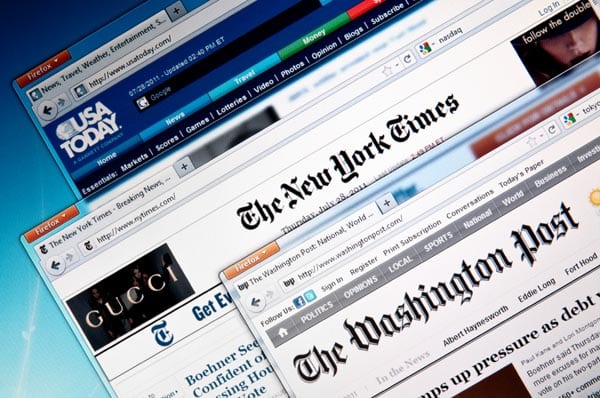The Value of Fact-Checking on the planet of News Online
The occurrence of false information in today's online news landscape has gotten to alarming degrees. Fact-checking organizations play a vital role in neutralizing this trend. They verify cases and improve the trustworthiness of journalism. The effectiveness of these organizations often pivots on their approaches and public understanding. As audiences browse this intricate setting, the ramifications of their findings might form the future of news consumption and trust. What does this mean for the honesty of information moving on?

The Rise of Misinformation in the Digital Age
Just how has the arrival of digital innovation contributed to the spread of misinformation? The quick development of the web and social media sites systems has actually assisted in the dissemination of details at an extraordinary speed. Individuals can share write-ups, video clips, and point of views with a mere click, usually without verifying the material's precision. Algorithms prioritize marvelous or emotionally billed material, resulting in an expansion of misleading narratives that catch interest.
Additionally, the privacy afforded by digital platforms allows individuals to spread false info without accountability (stnews.live). False information thrives in echo chambers, where customers are revealed mostly to viewpoints that reinforce their beliefs, further setting fallacies. The saturation of details can bewilder individuals, making it challenging to determine reputable sources from unstable ones. Misinformation has become a prevalent concern in the digital landscape, affecting public point of view and trust in legit news resources.
The Role of Fact-Checking Organizations
Fact-checking organizations play a vital function in improving the reputation of journalism by verifying claims made in news reports. Their efforts are important in combating misinformation, ensuring that exact details prevails in the digital landscape. By holding media electrical outlets answerable, these organizations add substantially to informed public discussion.
Enhancing Credibility in Journalism
While false information multiplies in the electronic age, fact-checking companies play a crucial duty in improving the integrity of journalism. These companies meticulously validate cases made in newspaper article, public statements, and social media sites articles, guaranteeing that info shared to the public is accurate and credible. By offering independent analyses, they work as a crucial resource for reporters, helping them maintain high criteria of stability. In addition, their initiatives promote openness in media, cultivating public trust. As target markets come to be significantly critical, the visibility of credible fact-checking entities can differentiate trustworthy news sources from those that may spread out fallacies. Ultimately, the commitment of fact-checking companies to support reliability is crucial for the wellness of democratic discussion.
Combating False Information Efficiently
As false information proceeds to spread quickly throughout electronic systems, the role of fact-checking companies ends up being increasingly crucial in the fight for precise information. These organizations serve as guard dogs, looking at cases made by public numbers and media outlets to ensure responsibility. By employing strenuous study approaches and expert analysis, they validate realities and clear up deceptive stories. Their findings are distributed via different networks, educating the public and promoting critical thinking. Additionally, partnerships with social media systems improve their reach, allowing for timely flagging of false info. As digital literacy expands, the impact of fact-checking companies is vital in encouraging audiences to determine reality from fraud, inevitably adding to an extra educated culture.
Exactly How Misinformation Affects Public Understanding
False information greatly undermines trust in media, leading audiences to question the integrity of news resources. As an outcome, individuals commonly are attracted towards electrical outlets that enhance their present ideas, adding to the polarization of viewpoints. This vibrant produces a fragmented info landscape, where shared understanding comes to be progressively challenging to achieve.
Count on Media

Count on media has actually come to be increasingly fragile in the digital age, where the rapid spread of incorrect info can alter public understanding. As false information proliferates across social networks and on the internet systems, audiences frequently find it challenging to recognize legitimate resources from undependable ones. This unpredictability fosters hesitation, leading lots of individuals to question the objectives behind news coverage. As a result, count on established media outlets has lessened, as customers increasingly turn to alternate sources that might lack extensive content criteria. This disintegration of trust fund not only influences private ideas but additionally weakens the collective capacity to involve in notified discussions. Inevitably, the integrity of journalism goes to risk, highlighting the important need for reliable fact-checking to restore self-confidence in the media landscape.

Polarization of Viewpoints
The raising skepticism towards standard media has actually contributed to an expanding polarization of opinions among the general public. Misinformation, often shared via social media and online platforms, plays a significant role in shaping distinct ideological separates. Individuals frequently seek out details that straightens with their pre-existing ideas, strengthening their viewpoints while dismissing opposing his response viewpoints. This resemble chamber impact escalates departments, causing a fragmented public discussion where consensus becomes significantly elusive. Additionally, sensationalized narratives thrive in this environment, additionally skewing public perception and cultivating question in trustworthy resources. As polarization rises, the need for reliable fact-checking becomes extremely important to bridge spaces and advertise educated discussions, inevitably guaranteeing a much more natural society capable of steering complex problems.
Techniques for Reliable Fact-Checking
Efficient fact-checking relies upon a systematic method that consists of comprehensive research, verification of resources, and essential evaluation of cases. A fundamental strategy is cross-referencing information from numerous legitimate resources to confirm its precision. Fact-checkers usually make use of specialized data sources and archives to map the origin of specific statements, ensuring that the reported info aligns with documented proof.
Another crucial method includes inspecting the context in which cases exist. Misleading details can arise from out-of-context quotes or selective information use. By taking a look at the broader story, fact-checkers can recognize prospective prejudices or misinterpretations.
Moreover, involving with professionals in pertinent areas can offer clarity and understanding that improves the fact-checking process. This partnership can discover subtleties that laypeople might ignore - stnews.live. Inevitably, a regimented strategy incorporating these methods promotes a more informed public, enhancing the integrity of information disseminated in the electronic age
The Influence of Social Media Site on News Consumption
Exactly how has social media sites transformed the method individuals consume news? The appearance of platforms like Facebook, Twitter, and Instagram has especially altered news intake patterns. News is currently disseminated rapidly, allowing users to gain access to real-time updates and engage with content through likes, shares, and comments. This immediacy has cultivated a choice for bite-sized details, commonly at the expenditure of extensive evaluation.
Additionally, social networks makes it possible for personalized news feeds, where algorithms curate content based upon user preferences, developing echo chambers that might restrict exposure to varied perspectives. The function of conventional news electrical outlets has actually lessened as individuals significantly rely on peer referrals and trending subjects. Consequently, the credibility of information is frequently endangered, as sensationalism can overshadow accurate reporting. In general, social networks has actually improved news consumption, stressing rate and personalization while testing the standards of journalistic stability.
Empowering Target Markets to Identify Reliable Sources

In addition, analyzing the authorship and organizational history of newspaper article can expose prospective biases. Cross-referencing details throughout numerous reputable electrical outlets even more boosts the verification process. Utilizing digital devices, such as internet browser expansions that rate the trustworthiness of web sites, can also aid in identifying trustworthy info. By actively involving with these sources and try this web-site cultivating a vital mindset, target markets can much better equip themselves to discern reliable news sources, eventually cultivating a much more informed society amidst the complexities of today's media environment.
The Future of Journalism and Fact-Checking
As the media landscape develops, the future of journalism and fact-checking deals with both challenges and chances. The increase of digital platforms has actually equalized information circulation, enabling varied voices to arise. Nevertheless, this has actually also led to the spreading of misinformation, demanding robust fact-checking mechanisms. Journalists will significantly depend on innovation, consisting of AI devices, to validate facts quickly and efficiently.
Partnership in between news companies and fact-checking entities is expected to enhance credibility and openness. Target market involvement will certainly play a vital duty, as educated readers come to be substantial companions in determining trustworthy content.
The demand for liability and accuracy is most likely to grow, pushing reporters to maintain high criteria in their coverage. Inevitably, the future of journalism may depend upon its capacity to adapt to technological improvements while keeping journalistic stability, making certain that fact-checking stays a keystone of reputable news.
Frequently Asked Inquiries
Exactly How Can I Report Misinformation I Come Across Online?
To report misinformation encountered online, people can utilize platform-specific coverage tools, supply clear evidence, and share the info with fact-checking companies. Involving with neighborhood conversations can also assist raise recognition about the misinformation.
What Are Common Signs of False Information in News Articles?
Common signs of misinformation in newspaper article include sensational visit this page headings, absence of reliable resources, emotional language, inconsistent realities, and lack of writer credentials. Readers must seriously assess web content for these signs to determine precision.
Just How Do Fact-Checkers Confirm Sources?
Fact-checkers confirm sources by cross-referencing info with reputable data sources, consulting specialists, and examining the original context of claims. They also analyze the dependability of the sources, ensuring accurate and reliable info for public consumption.
What Lawsuits Can Be Taken Versus False information?
Lawsuits versus false information might include character assassination suits, cease-and-desist orders, and regulatory charges. Victims can seek remedy through civil courts, while some jurisdictions impose fines or assents on systems sharing incorrect information.
Are There Apps for Fact-Checking News On-The-Go?
Various apps exist for fact-checking news on-the-go, including Snopes, FactCheck.org, and PolitiFact. These applications aid individuals confirm cases promptly, advertising educated decision-making and promoting an extra critical method to consuming news in real-time.